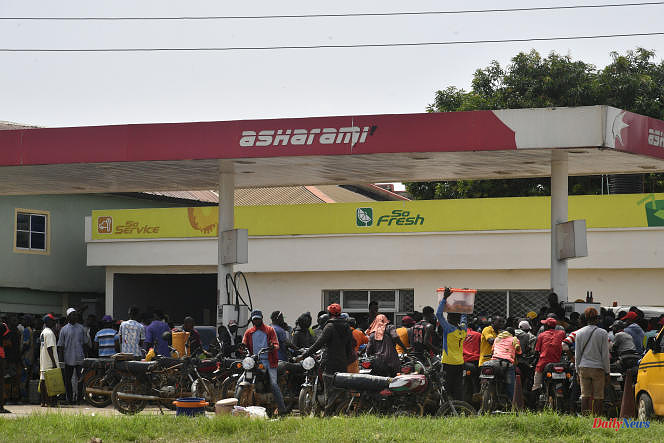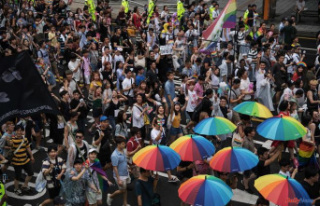A few words, spoken during the inaugural speech of new President Bola Ahmed Tinubu, in Abuja on Monday 29 May, will have sufficed to trigger a process which should lead very quickly to the official abolition of subsidies on gasoline imports, which have plagued the Nigerian economy for ages. “The subsidies no longer exist,” said the head of state, departing for a moment from the official script distributed to the press. The next day, worried Nigerians stormed gas stations across the country, triggering yet another fuel shortage.
“I knew something had changed when I got on my bus to go to work,” Precious says, outside her vegetable stall in Obalende Market, Lagos. The driver asked me for 300 naira when normally I only pay 100 naira for this trip. This is where I was told the gasoline had gone up. The price of fuel nearly tripled in just one day, Wednesday, May 31.
In the afternoon, the National Petroleum Company of Nigeria (NNPC) issued a statement informing consumers that "the price of petrol at the pump at [its] service stations has been adjusted in line with the reality of the market ". This represents an increase of up to 488 naira per liter at NNPC stations, whereas this was only 184 naira forty-eight hours earlier. Private service stations quickly lined up, often posting even higher prices.
Considerable shock
For Nigerians, who see access to cheap fuel as one of the few privileges they derive from their oil power, the shock is considerable. Especially since gasoline is also used to power generators for lighting, in a country with an extremely failing electricity network. "I sent my daughter to get gas for our generator yesterday, I couldn't believe my eyes when I saw she only brought me a bottom of jerry can!" exclaims Precious, amazed. In the process, the price of foodstuffs rose sharply on the market. "We knew that the subsidies were going to disappear, but this is really violent," laments Aziz, who manages taxis in a nearby parking lot. The cost of a seat in one of his cars, packed to the brim, has risen by 100 naira since the start of the week. "We should double our prices, but that's impossible, people wouldn't be able to afford it. So we lose money,” explains the 50-year-old.
The change is all the more brutal as communication around this subject is, for the time being, almost non-existent. “There is not a lot of transparency in what is happening, regrets Noelle Okwedy, analyst for the firm Stears in Lagos. We knew that the subsidies were budgeted until the end of June, but obviously there was a desire to act more quickly. »
The Nigerian government had adopted, in August 2021, a "Petroleum Industry Act" organizing the deregulation of the market and putting an end - in principle - to subsidies. But the administration of former President Muhammadu Buhari had continued to finance this aid to imports, which cost Nigeria $ 10 billion in 2022.
A "strong political signal"
Despite their deleterious weight on the economy, no one imagined that the new head of state would get rid of them from the first day of his mandate. "It's a strong political signal for investors," admits Noelle Okwedy. The president wants to show his seriousness, his desire to reduce the debt and to be more efficient. Nigeria was until then forced to borrow to finance this controversial aid, going into debt in increasingly unsustainable proportions. “The government has been under pressure from the World Bank and the International Monetary Fund for a long time on this subject, adds Mickaël Vogel, director of the research firm Hawilti, in Lagos. It is estimated that almost half of the subsidized fuel imported into Nigeria is trafficked to neighboring countries. For this sector specialist, the removal of subsidies should not only benefit private operators in the oil sector, but also give impetus to the gas industry in Africa's largest market.
“Coming out of the initial shock for the population who are already facing huge inflation, this is good news for Nigeria, assures a player in this sector in Nigeria, who speaks on condition of anonymity. We have spent ridiculous sums on these subsidies when they could have been invested in infrastructure, health, education or the industrialization of the economy. He just regrets that the government has not announced palliative measures to support the population in this transition. "But let's not kid ourselves either: due to repeated shortages in recent months, the price of petrol had already risen significantly across Nigeria. »
In the streets of Lagos, many are resigned to this long-announced increase. "We'll be fine, as usual," said Solomon, a tailor from Obalende. We faced Covid-19, the economic crisis, gasoline and cash shortages [following a controversial monetary policy by the central bank at the start of the year]. We can only hope that all this will finally lead to something positive for the future of our country. »












